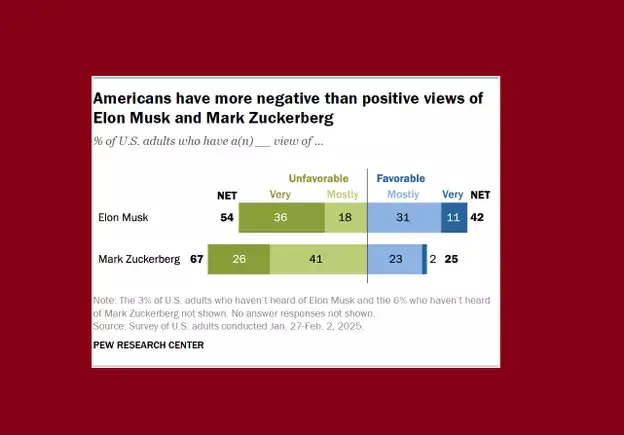In an age where technology intertwines more with daily life than ever, figures like Elon Musk and Mark Zuckerberg have found themselves at the forefront of innovation, yet also marred by controversy. Recent data from a Pew Research survey reveals a stark decline in public perception towards these influential leaders, raising questions about their legacies and trustworthiness in a hyper-connected world.
The Pew Research survey, conducted from January 27 to February 2, 2025, showcases a notable trend: a significant portion of the American populace harbors negative views regarding Musk and Zuckerberg. Specifically, 54% of U.S. adults express dissatisfaction towards Musk, with 36% categorizing their feelings as “very unfavorable.” In contrast, Zuckerberg fares even worse, with around two-thirds—approximately 66%—of Americans viewing him unfavorably. This includes a notable 26% who hold extremely negative opinions of him. On the other end of the spectrum, 42% of respondents support Musk, with a minuscule 11% praising him enthusiastically, while only 25% extend favorable views toward Zuckerberg, with just a mere 2% feeling very favorable.
These findings not only reflect individual disapproval but also hint at broader societal scrutiny of billionaire entrepreneurs wielding their power. The public’s views have been shaped by the actions of these magnates, whose decisions stir mixed emotions ranging from admiration for their achievements to disdain for their controversial behaviors.
Actions Speak Louder Than Words
A closer examination of the behaviors and decisions made by Musk and Zuckerberg reveals a narrative rife with self-inflicted wounds that engender discontent among the masses. Musk, known for his ambitious ventures like SpaceX and Tesla, has attracted criticism for his unpredictable behaviors and controversial statements, particularly in the political realm. His public and personal decisions—from distancing himself from his daughter to waging legal battles against critics—amplify perceptions of him as erratic and self-serving. Rodent-like behaviors, such as turning Twitter into a platform predominantly reflecting his subjective viewpoints, further exacerbate these sentiments.
Conversely, Zuckerberg’s image is marred by the Facebook Data Scandals, ethical concerns surrounding data privacy, and a perceived negligence towards the well-being of users. Accusations of profiting off user data and promoting platforms potentially harmful to adolescents contribute to a growing distrust of his leadership. In addition, his acquisition of land in Hawaii has drawn ire from local communities, further complicating the public’s perception of him.
What emerges from the analysis of these two figures is a fundamental narrative of influence intertwined with irresponsibility. Both Musk and Zuckerberg wield immense power, shaping technological landscapes and societal norms. However, with such influence comes accountability, and current trends suggest a concerning lack of consideration for societal ramifications. Their resistance to regulation is emblematic of a mindset that prioritizes business growth and personal ambition over communal welfare.
This growing detachment raises questions regarding the relationship between power and ethics. Can unchecked ambition lead to detrimental social impacts, particularly when tech moguls operate free from regulatory constraints? History speaks volumes on the dangers of allowing influential figures unfettered access to societal resources and narratives.
Looking Ahead: A Future of Uncertain Legacies
While some may argue that Musk and Zuckerberg are destined to be recognized as visionary leaders, the swirling tide of public opinion hints at a more perilous future. The distrust festering in the hearts of many citizens could ultimately reshape how we view these individuals and their respective legacies. Should checks and balances remain lax, society risks paying the price for the unchecked ambition that seems to drive these tech titans.
As tech leaders navigate the complexities of modern society, it is imperative for the public to remain vigilant, ensuring that accountability is upheld. As the surveys indicate dwindling approval ratings and rising dissatisfaction, one can only hope that Musk and Zuckerberg will take heed, recalibrating their visions to embrace a more ethical, community-oriented approach. The future of their industries—and their reputations—depend on it.


Leave a Reply